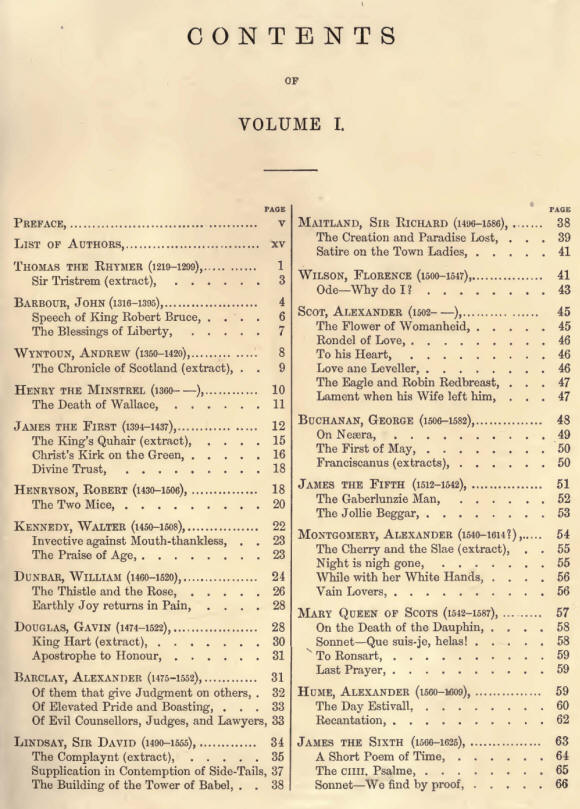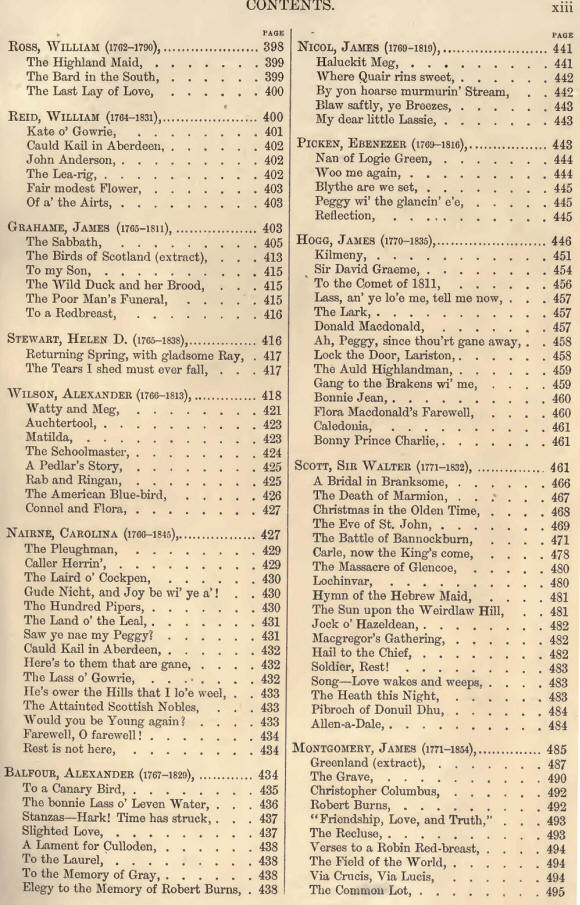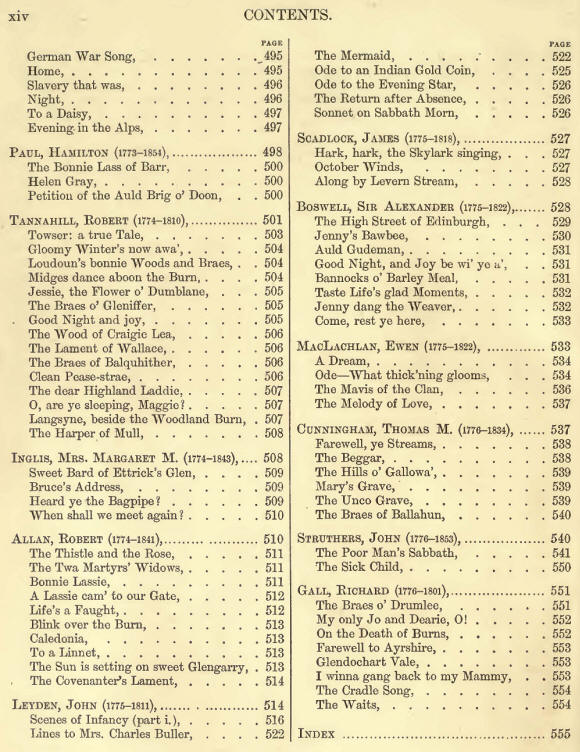|
PREFACE
The purpose of this Work is to give a
comprehensive view of Scottish Poetry from the earliest to the present
time, in a condensed and easily accessible form. Comparatively few
persons can command sufficient leisure to enable them to examine
thoroughly, in these busy days upon which we have fallen, the wilderness
of separate volumes of the Scottish poets, and still fewer can afford to
place them on the shelves of their libraries. Many readers regret being
thus deprived of the opportunity of becoming fully acquainted in a
systematic manner with a body of poetry and song, than which there is
none superior in the literature of any land ancient or modern. To all
such the present work it is believed it will come as a great boon. It
will be found to present selections from the writings of some two
hundred and twenty Scottish poets, sufficiently ample in extent to
enable the reader to form a precise opinion respecting the style and
merits of the authors.
Another purpose of this Work is to supply what has long been a
desideratum in Scottish literature—concise biographies of the poets,
with notices of their works, and critical remarks upon their writings—
to tell, in short, when they lived, what they wrote, and the estimation
in which their writings are held by competent authorities. To quote the
words of one whose poems are included in this Collection, “We have R
undertaken to discourse here for a little on the Poets, what ideas men
have formed of them, what work they did.”
The two volumes in which this Work is comprised will be found to contain
a large and satisfying proportion of all that is truly beautiful among
the productions of the best-known Scottish poets. That every reader
should find in these pages every one of his favourite poems is perhaps
too much to expect; but it is believed that of those on which the
unanimous verdict of the intelligent has set the seal of being worthy of
preservation, few, if any, will be found wanting. The work covers a
period of above six hundred years, the first poem in the collection
having been written about the middle of the thirteenth century, and the
latest during the third quarter of the nineteenth. Embraced within the
time from Thomas the Rhymer to Robert Buchanan will be found more than
ten-score names of Scottish singers, not all alike in the measure of
their fame, for “one star differeth from another star in glory;” but
names that are thought to be worthy of honourable mention among the
minstrels of their native land—that noble brotherhood who speak for
themselves in tones of harmony, grandeur, and pathos, and upon whom
"Wordsworth bestowed his benediction:—
“Blessings be with them, and eternal praise,
Who gave us nobler loves, and nobler cares,—
The Poets! who on earth have made us heirs
Of truth and pure delight by heavenly lays!”
The writings of the earlier poets being
couched in language not easily understood except by students of ancient
literature, it has been deemed expedient to restrict the extracts from
their works to short specimens, which, however, exhibit the form in
which their thoughts were conveyed.
But to enable the reader fulty to understand the nature and scope of
these writings, detailed descriptions have been given of their subject
matter, with such explanations as seemed to be required. On the other
hand, full scope has been given to the more modern poets, from whose
writings very copious extracts have been made; and many admirable and
lengthy productions, such as Ramsay’s “Gentle Shepherd,” Beattie’s
“Minstrel,” Blair’s “Grave,” Home’s “Douglas,” Grahame’s “Sabbath,”
Campbell's “Pleasures of Hope,” and Pollok’s “Course of Time,” appear in
full in these pages. Other poems of too great length to be given
complete, are represented by such ample extracts that after their
perusal the reader will find himself quite at home with the author.
Independently of names like those of Burns and Scott, that stand as
landmarks in the world’s literature, it may be truthfully asserted that
no nation beneath the sun is more abundant than Scotland in local bards
that sing of her streams and valleys and heathery hills, till almost
every mountain and glen, every lake and brook of North Britain, has been
celebrated in sweet and undying song. If it be true, as it has been
said, that Scotland has given birth to two hundred thousand poets, the
Editor asks for a generous and kindly consideration in his delicate and
diflieult duty of selecting some two hundred and twenty names from that
large number, as well as for such other shortcomings as may doubtless be
discovered in a work of this nature.
It is the peculiar good fortune of the compiler of these volumes, the
preparation of which has been with him for several years a labour of
love, to be able to present to his readers unpublished poems by Robert
Burns, William Tennant, Mrs. Grant of Laggan, Henry Scott Riddell, John
Leyden, Hew Ainslie, Evan MacColl, and others who find an appropriate
niche in this Walhalla. There remains the agreeable duty of returning
grateful thanks to the authors who have contributed original
contributions to these pages, and to other living writers and their
publishers, who have given permission to make use of copyright poems, as
well as to many friends who have communicated information and in various
ways afforded facilities to the Editor in the preparation of this Work.
There is a passage in an ancient volume which appears to be appropriate
as a concluding paragraph to this introductory page. Cotton Mather
remarks, in the dedication to his Decennium Luctousom, “Should
any petit monsieur complain (as the captain that found not himself in
the tapestry hangings which exhibited the story of the Spanish invasion
in 1588) that he don’t find himself mentioned in this history, the
author has this apology: He has done as well and as much as he could,
that whatever was worthy of a mention might have it; and if this
collection of matters be not complete, yet he supposes it may be more
complete than any one else hath made; and now he hath done, he hath not
pulled up the ladder after him: others may go on as they please with a
completer composure.”
New York, January, 1876.






We are splitting up these volumes in pdf
segments so you can read them in stages.
Read more about him in
our Significant Scots page
Contents
Pages 1
- 18
Pages
18 - 33
Pages 34 -
54
Pages
54 - 69
Pages 70 -
101
Pages 101 - 133
Pages 133
- 162
Pages 162
- 201
Pages
201 - 232
Pages 233 -
268
Pages
269 - 317
Pages 318 -
372
Pages 373 - 415
Pages 416
- 446
Pages 446 -
484
Pages
485 - 536
Pages 537
- 554
Volume 2
Contents
Pages 1 - 84
Pages 85 -
177
Pages 177
- 280
Pages 281 -
377
Pages 378 - 476
Pages 477 - 510
Appendix
Index
Glossary |

